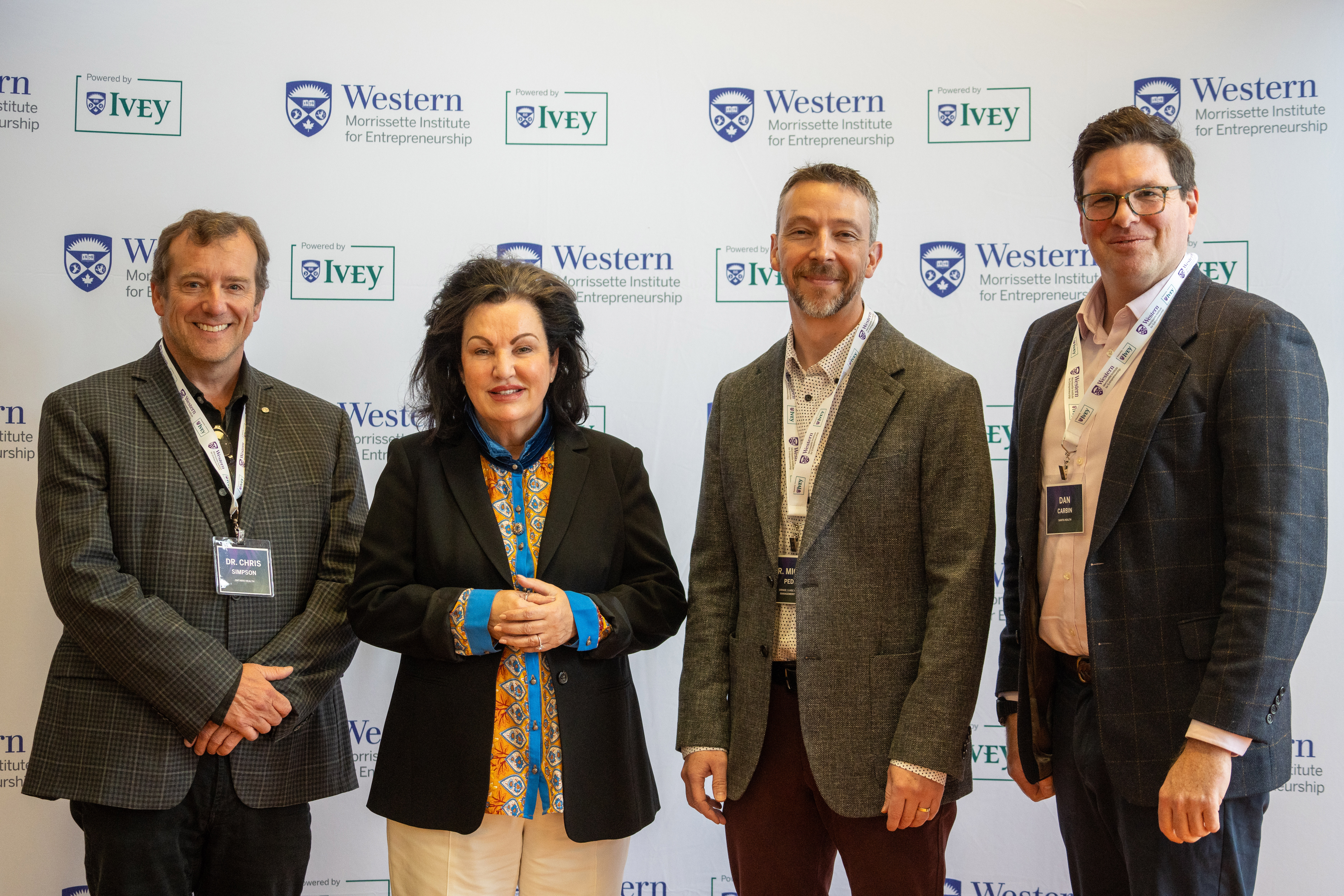Over 150 students joined the launch of The President's Challenge, the latest initiative of the Morrissette Institute for Entrepreneurship Powered by Ivey, which aims to create innovative solutions for the problems overwhelming Canada's healthcare system.
The kick-off on January 23rd included a panel discussion with experts who provided an overview of the various challenges and their interconnected nature. They covered topics ranging from funding for homecare, clinics, and family practitioners, to stresses on hospital emergency rooms, and long-term healthcare units, as well as the role played by public policy. The panel (pictured in order below) included Dr. Chris S. Simpson, Executive Vice President and Chief Medical Executive, Ontario Health, Connie Clerici, QS’08, LLD’22, Founder & Executive Chair of the Board, Closing the Gap Healthcare Group, Dr. Michael Peddle, Associate Medical Officer at Ornge, Medical Director for the LHSC Emergency Management Program, and Dan Carbin, Principal and Co-Founder, Santis Health.

Students will have the opportunity to form teams of 2-4 to propose their solutions to the wide range of problems impacting the healthcare sector. Each team must include students from at least two different faculties.
On March 12th, the best 10 submissions will pitch their ideas in a virtual competition. The top five teams selected from this leg will be invited to present at The President’s Challenge Final in Toronto, on April 5th, and be in line to win cash prizes between $10,000 and $1,000. The top three teams will also have the opportunity to work with faculty and researchers at Western to either publish a white paper on their solution, engage in further research, or develop their solution through the Western Accelerator.
Here are some of the key learnings from the panel discussion at the launch event on January 23rd.
Change, Complexity, and Capacity
The challenges facing the Canadian healthcare industry aren't a surprise. Many experts have been sounding the alarm bells for over a decade according to the panelists. The last major reforms over 20 years ago were brought on by public pressure.
The emergency room wait times that often capture the media’s attention are just one part of larger systemic issues. Still, the situation in emergency rooms around the country is a good indicator of the overall health of the system.
“Just because we have a system that used to work, it doesn’t mean that it works or will work in the future,” said Connie Clerici.
Canadians are living longer and experiencing more health concerns as they age. Canada’s aging population makes up a significant percentage of those accessing the healthcare system. They are also bringing more complex issues to the hospital, which require more time and expertise to address. This in turn increases the strain on the system’s capacity.
In many ways, solutions to any specific problem within the system should also take into account the unintended consequences changes and new policies can create.
It’s not just about hospitals
Healthcare is a deeply personal journey for people, and many don't want to be hospitalized for care. Over 78% of people in Ontario would prefer to be home and receive medical attention, especially if hospitalization is not necessary.
Canada's healthcare system includes a variety of players, like family doctors, and primary caregivers, but much of the funding and focus is on hospitals.
Some experts argue that hospitals shouldn’t be the first stop for Canadians seeking healthcare; they should be resorted to when hospitalized care is the best treatment option.
Limited tools for policymakers
The current set of tools for policymakers is limited. These include more funding for nurses, doctors, and hospitals (amongst other things), pushing patients quicker through the system by placing them in transitional care units and making the system more efficient.
The idea of efficiency itself was challenged by the panel, stating that the system shouldn’t be operating at 100-110% at all times, leaving little margin for extraordinary circumstances. Operating at such high levels of efficiency is difficult for those serving within the healthcare system.
The panel also cited a lack of empathy for medical professionals. These sentiments and the increasing burnout caused by capacity issues are making it harder to attract talent to serve in the industry - particularly in the hands-on roles of nurses and personal support workers (PSWs).
Adding to that strain, many experienced doctors and nurses are retiring early given the growing strain on their own mental and physical health.
What does the future look like?
The panelist touched on several worrying statistics and future predictions. For example, by 2030, Canada will be short of 150,000 PSWs. As the number of those serving in the larger system decreases due to hiring shortages, over 3.5 million Canadians could be without primary healthcare.
The stage is set for solutions exploring new technology, new systems from other countries, or disruptive new players. “As Canadians, we accepted that waiting is the price we have to pay for universal healthcare… we have to reject that idea,” said Dr. Chris Simpson.
To learn more about The President’s Challenge, and how to sign up, visit the competition page.
